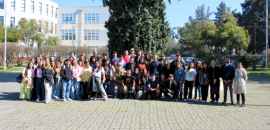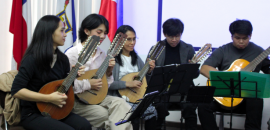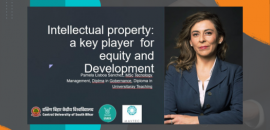- Español
- English
You are here
Taiwanese Student Completed Research Internship at the USACH Molecular Genetics Laboratory

Elaine Lin, a student from the National Taiwan University, traveled to Chile to undertake a stay that allowed her to explore fermentation processes and analytical methods.
As part of the collaboration between laboratories, Elaine Lin, a student of the Genomic and Systems Biology Program at the National Taiwan University (NTU), recently completed a research internship at the Molecular Genetics Laboratory, supervised by researcher Dr. Francisco Cubillos Riffo, an academic from the Department of Biology at the Faculty of Chemistry and Biology, and a member of the Doctorate in Biotechnology program.
Both Dr. Francisco Cubillos and Elaine's advisor in Taiwan receive funding from the European Molecular Biology Laboratory (EMBL), the institution that provided the grant which facilitated Elaine's stay at USACH, with the aim of fostering exchange between laboratories.
"Dr. Cubillos's laboratory specializes in yeast phenotyping and has a fully established system for fermentation and its analytical methods. My laboratory is interested in the yeast fermentation technique used in Dr. Cubillos's laboratory," Elaine Lin commented, referring to her motivation for undertaking the research internship at USACH. Regarding her experience working with the researcher from the Faculty of Chemistry and Biology, she noted, "I think he is a professor passionate about teaching, based on some discussions we had."
Considering the experience she would have at the Molecular Genetics Laboratory at USACH, Elaine brought with her a significant part of the study material from her research in Taiwan, intending to carry out a preliminary experiment to discover which strain could yield the best results. "I brought some Taiwanese strains of wild yeast to Chile and applied them to beer, mead, cider, and wine fermentations in triplicate, totaling 453 fermentations, to examine their performance and sugar consumption capacity," she detailed.
Regarding her experience at the University of Santiago of Chile, and specifically at the Molecular Genetics Laboratory, Elaine commented that "the working styles of South America and Asia are different, and it will be an unforgettable memory to have had the opportunity to experience these cultural differences. The practices, in turn, helped my laboratory improve its skills. When I choose my work environment in the future, this will be one of the factors to consider," she assured.
Finally, from the Department of International Relations, we emphasize the importance of strengthening and fostering institutional relationships with partners in Taiwan and Asia. Collaborations that not only enrich our global perspective but also drive the exchange of knowledge, innovation, and joint progress.
News
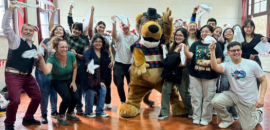 International students learn cueca with Usach Without Borders and Department of Cultures and Arts
International students learn cueca with Usach Without Borders and Department of Cultures and Arts
12 Sep 2024
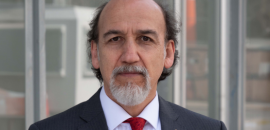 Rector Vidal to join the Governing Board of UNESCO's International Institute for Higher Education
Rector Vidal to join the Governing Board of UNESCO's International Institute for Higher Education
2 Sep 2024
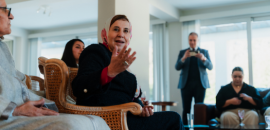 Students visited the Ambassador of Morocco to learn about the country's diplomatic work and culture
Students visited the Ambassador of Morocco to learn about the country's diplomatic work and culture
25 Jul 2024

